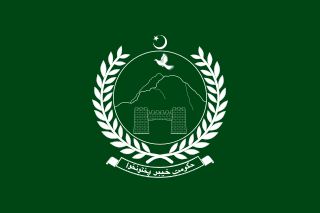The 2008 Pakistani provincial elections may refer to:
The 2008 Pakistani provincial elections may refer to:
Sting may refer to:

A city is one of the units of local government in the Philippines. All Philippine cities are chartered cities, whose existence as corporate and administrative entities is governed by their own specific municipal charters in addition to the Local Government Code of 1991, which specifies their administrative structure and powers. As of December 17, 2022, there are 148 cities.

Iran is subdivided into thirty-one provinces, each governed from a local centre, usually the largest local city, which is called the capital of that province. The provincial authority is headed by a governor-general, who is appointed by the Minister of the Interior subject to approval of the cabinet.

Since its establishment in 1947, Pakistan has had an asymmetric federal government and is a federal parliamentary democratic republic. At the national level, the people of Pakistan elect a bicameral legislature, the Parliament of Pakistan. The parliament consists of a lower house called the National Assembly, which is elected directly, and an upper house called the Senate, whose members are chosen by elected provincial legislators. The head of government, the Prime Minister, is elected by the majority members of the National Assembly and the head of state, the President, is elected by the Electoral College, which consists of both houses of Parliament together with the four provincial assemblies. In addition to the national parliament and the provincial assemblies, Pakistan also has more than five thousand elected local governments.
Adam Scott may refer to:
Iqbal, Eqbal, Ikbal, or Eghbal may refer to:
Iberville is a provincial electoral district in the Montérégie region of the province of Quebec, Canada. It is located south of Montreal. It includes part of the city of Saint-Jean-sur-Richelieu, as well as Marieville, Saint-Césaire and Mont Saint-Grégoire.

The Provincial Assembly ofKhyber Pakhtunkhwa is a unicameral legislature of elected representatives of the Pakistani province of Khyber Pakhtunkhwa, which is located in Peshawar, the provincial capital. It was established under Article 106 of the Constitution of Pakistan, having a total of 145 seats, with 115 general seats, 26 seats reserved for women and 4 reserved for non-Muslims. The 11th Provincial Assembly of the Khyber Pakhtunkhwa was dissolved on 18 January 2023, and the province is set to elect a new legislature on 8 October 2023.
The Wildrose Party was a conservative provincial political party in Alberta, Canada. The party was formed by the merger in early 2008 of the Alberta Alliance Party and the unregistered Wildrose Party of Alberta. The wild rose is Alberta's provincial flower.

The Election Commission of Pakistan is an independent, autonomous, permanent and constitutionally established federal body responsible for organizing and conducting elections to the national parliament, provincial legislatures, local governments, and the office of President of Pakistan, as well as the delimitation of constituencies and preparation of electoral rolls. As per the principles outlined in the Constitution of Pakistan, the Commission makes such arrangements as needed to ensure that the election is conducted honestly, justly, fairly and in accordance with law, and that corrupt practices are guarded against. The Election Commission was formed on 23 March 1956 and has been restructured and reformed several times throughout the history of Pakistan.
GeoBase is a federal, provincial and territorial government initiative that is overseen by the Canadian Council on Geomatics (CCOG). It is undertaken to ensure the provision of, and access to, a common, up-to-date and maintained base of quality geospatial data for Canada. Through the GeoBase, users with an interest in geomatics have access to quality geospatial information at no cost and with unrestricted use.

The President of Nepal is the head of state of Nepal and the commander-in-chief of the Nepalese Armed Forces.
Gampaha electoral district is one of the 22 multi-member electoral districts of Sri Lanka created by the 1978 Constitution of Sri Lanka. The district is conterminous with the administrative district of Gampaha in the Western province. The district currently elects 18 of the 225 members of the Sri Lankan Parliament and had 1,785,964 registered electors in 2020.
Adawan Amal Praba Ganesan is a Sri Lankan politician and former Member of Parliament. He is the current leader of the Democratic People's Congress (DPC), a member of the United People's Freedom Alliance (UPFA).
The 2018 Pakistani provincial elections may refer to:
The 2013 Pakistani provincial elections may refer to:
The 2002 Pakistani provincial elections may refer to:
Thandiwe Rose Marry Zungu is a South African politician and a Member of Parliament (MP) for the African National Congress from KwaZulu-Natal.
Nocawe Noncedo Mafu is a South African politician currently serving as Deputy Minister of Sports, Arts and Culture. She has been a member of the National Assembly since 2014. She was Chairperson of the Portfolio Committee on Human Settlements from 2014 to 2019. Mafu is a member of the African National Congress.
Zola Mlenzana is a South African politician. A former member of the Congress of the People, he was elected as a Permanent Delegate to the National Council of Provinces from the Eastern Cape in 2009. In 2014 he resigned from COPE and rejoined the African National Congress. Mlenzana was elected to the National Assembly in 2019.